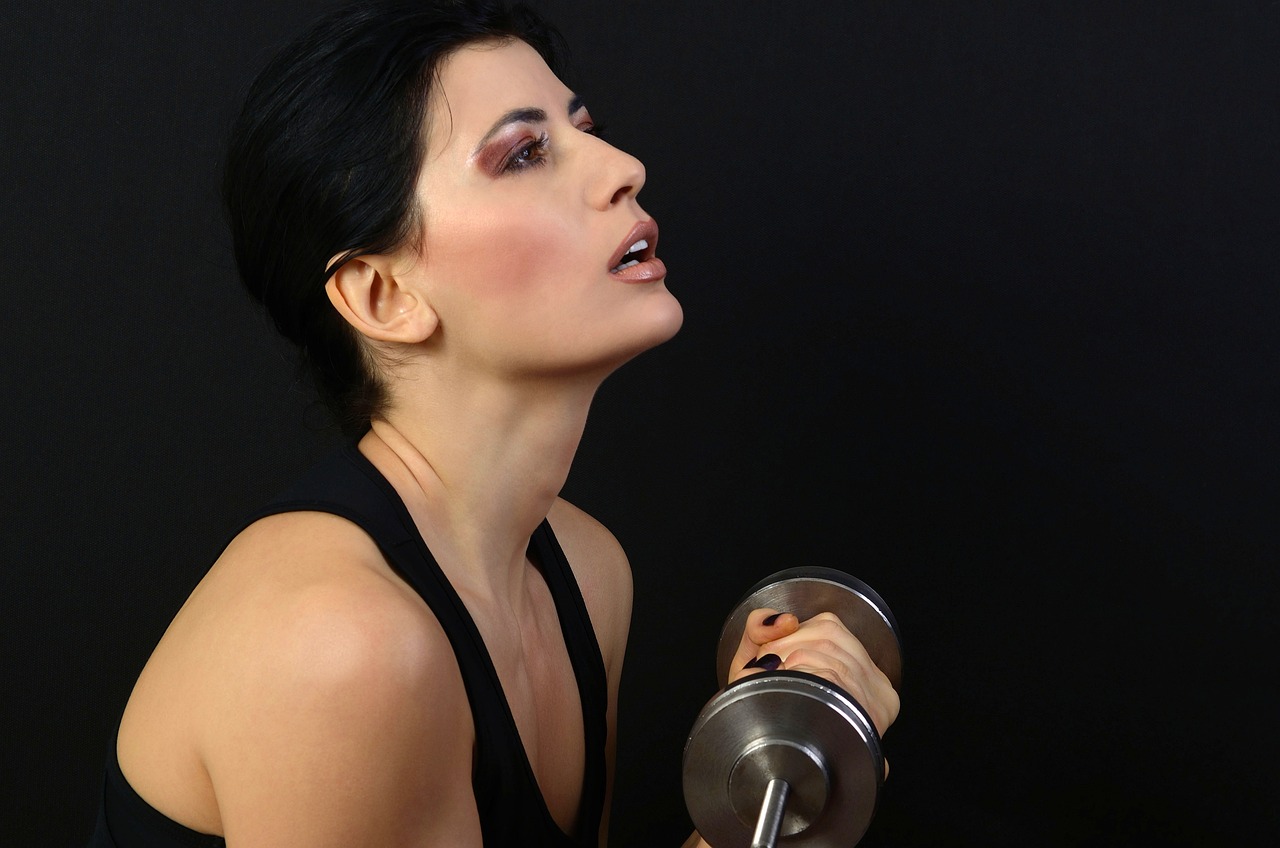
You’ve been wanting to try the cardio dance class everyone’s been talking about. You sign up and pick out your cutest gym outfit—ready to slay your workout. But you walk in and you immediately regret it.
The room is full of women seemingly fitter than you. Never have you felt more aware of the size of your body. This was supposed to be a fun and health-giving experience, but it’s become a serious self-loathing session.
If you’ve ever experienced body comparison at the gym, you know it can dissolve your happiness in a blink. But the gym is a place for folks of ALL sizes. So how do you take advantage of the fitness classes and equipment there—without feeling discouraged about your body image?
Studies show that comparing your physique to others lowers your positive body image and increases your odds of developing an eating disorder. Below nutrition and fitness experts, who assist people in their body-acceptance journeys, are offering advice on how to not size yourself up to others when you work out.
5 tips to stop engaging in body comparison at the gym 1. Prepare your mind in advance
When it comes to addressing body image issues around exercise, the work starts before you enter the gym doors, says Rebecca Toutant, RD, CEDS, CDCES, CPT of Nourishing Bits and Bites. Consider your self-talk while working out. Is it negative or positive? Do you already struggle with body acceptance?
Often repetitive negative thoughts about our body aren’t true. Toutant reminds us, “What we ‘see’ in the mirror and in looking at others is not objective truth or fact. Rather, how our brain processes the information is influenced by our emotional state.”
How can you get amped up with positive thoughts before a workout? Start with gratitude for your own body. Affirmations and personal mantras can be repeated to flip negative thinking to positive. Eating disorder specialist Laurie Dunham, RD, CED-S, LD, suggests the following examples:
- “I am thankful for my strong legs that carry me through the day.”
- “I am thankful that my arms allow me to hug the people I love.”
- “I am grateful for a functioning GI system that allows me to properly digest food so I have the energy needed to work and play.”
- “I am enough.”
- “I am strong.”
- “I am more than a body.”
What else can boost your confidence before you walk into the gym? The right playlist! Toutant suggests, “Choose empowering audio. Put on some tunes that leave you feeling strong and confident.”
If that doesn’t feel like enough to help you work through any blocks or limiting beliefs you have about your body, consider seeking out help from a therapist to get to the root causes and address them.
2. Appreciate body differences
The gym presents a display of various body types. The key is to not compare and despair when you see people who look different than you. “There will always be aspects of others we are envious of, but if we can turn that energy into trying to appreciate differences, it can be incredibly beneficial,” Dunham says. “It would be so boring if we all looked the same!”
Studies show that body appreciation is related to better eating habits, fewer body image disturbances, and overall improved mental health. Add to that list enhanced sexual satisfaction and self-compassion and I’d say it’s time to extend a thank you to your body.
Furthermore, your body size does not determine your physical fitness or overall health. “Someone can ‘look’ what society may describe as ‘healthy’ or ‘fit’, but they may be struggling with health or performance,” Toutant points out. Conversely, health is possible at every size—despite what weight stigma would have us believe.
3. Focus on your own fitness
Ever hop on the treadmill next to someone and enter an unspoken competition? Or add on more weight than what’s comfortable to the barbell because someone else can lift that much? Using someone else’s performance as a measuring stick for your abilities is a surefire way to increase your chances of injury and overtraining.
“Your needs and progress are your own,” Toutant says. “Whether or not someone can do more or go faster doesn’t ‘undo’ how far you’ve come. You ARE worthy of belonging right here, right now, as you are. There’s nothing to prove.”
When you feel your gaze wondering to those around you to see how you stack up to what someone else is doing, take it as a sign to recenter yourself and remember why you’re working out in the first place. “Focus on intrinsic goals,” Dunham says. “Think about where you are now and where you want to be concerning strength, flexibility, endurance, and how you feel, both mentally and physically, every day.”
4. Be friendly
Your insecurity may make you feel closed off from others, but gym friends can make all the difference! Resist the urge to withdraw. “Smile. Laugh. Consider eye contact. So many people walk around plugged in, blank stare, and in their own world—often to preserve themselves,” Toutant says. “You don’t need to make best friends, but it’s okay to acknowledge one another.”
While you may think everyone is noticing your imperfections, other gym-goers are not concerned about your body. Instead, everyone is in the same boat. They may even be feeling apprehensive about a new class or gym like you are, which is totally normal.
“Many people feel insecure at the gym,” Toutant says. “There is so much vulnerability in trying something new, re-starting a journey after a pause, moving your body in new ways, your body not feeling the way it used to, seeing unfamiliar faces, and quite literally feeling physically and emotionally uncomfortable. Just know at the end of the day, we’re all human.”
5. Find a place where you feel welcome
Not all gyms are created equal. Every facility will have its own feel. “Find the ‘gym culture’ that aligns with your values,” Toutant suggests. “If you choose to go to a gym rooted in hierarchies and competition, it may not be the best move for feeling better in your body.”
What’s the messaging promoted by the gym? Is it all about body modification or body inclusivity? Look at customer relations. Do the trainers treat everyone the same? Are you greeted kindly?
If you’re not feeling the vibe, find an alternative option for exercising. “Movement can happen anywhere,” Toutant says. “If being in the gym is too much of a distraction or leaves you feeling rough about what you’ve done or are doing, take a break and focus on your own path.”
body {
font-family: Arial, sans-serif;
max-width: 800px;
margin: 0 auto;
padding: 20px;
}
h1 {
text-align: center;
color: #333;
}
h2 {
color: #333;
}
p {
line-height: 1.5;
}
Stop Comparing Your Body to Others at the Gym: Here’s How to Preserve Your Joy and Confidence
Understanding the Harmful Effects of Comparison
Going to the gym should be a positive and empowering experience. It’s a place where you can focus on your health,
strength, and personal goals. However, many individuals fall into the trap of comparing their bodies to others,
which can lead to feelings of inadequacy, low self-esteem, and a loss of joy in their fitness journey.
The Dangers of Social Comparison
Comparing yourself to others is a natural tendency, but it can be detrimental to your mental well-being. Constantly
measuring your progress against someone else’s can make you feel like you’re not good enough or that your efforts
are in vain. This negative mindset can hinder your progress and enjoyment of exercise.
Focus on Personal Goals
Instead of fixating on how you measure up to others, shift your focus to your personal goals. Set realistic and
achievable targets that are specific to your needs and desires. Whether it’s improving your strength, endurance,
or overall fitness level, working towards personal goals will help you stay motivated and satisfied with your
progress.
Embrace Your Unique Journey
Every person’s fitness journey is unique. Our bodies respond differently to exercise, and we all have varying
strengths and weaknesses. Embrace your individuality and appreciate the progress you make along the way. Remember
that comparing yourself to others is like comparing apples to oranges – it’s an unfair comparison that doesn’t
reflect your true worth.
Practice Self-Compassion
Be kind to yourself throughout your fitness journey. Instead of criticizing your perceived flaws, practice
self-compassion. Treat yourself with the same kindness and understanding you would offer to a friend. Celebrate
your achievements, no matter how small, and learn from setbacks without being too hard on yourself.
Avoid Negative Self-Talk
The way we talk to ourselves matters. Negative self-talk can be incredibly damaging to our self-esteem and
overall well-being. Be aware of the thoughts and words you use when evaluating your progress. Challenge negative
beliefs and replace them with positive affirmations. Remind yourself of your strengths and the progress you’ve
made so far.
Find Inspiration, Not Comparison
Instead of comparing yourself to others, use their achievements as inspiration. Surround yourself with positive
role models who motivate you to push harder and reach your own goals. Learn from their techniques, but remember
that your journey is unique, and what works for them may not work for you.
Focus on Non-Physical Benefits
Remember that exercise is not just about physical appearance. Regular physical activity has numerous health
benefits, such as reducing stress, boosting mood, improving sleep quality, and increasing overall energy levels.
Shift your focus from external appearance to these non-physical benefits, and you’ll find greater joy and
fulfillment in your fitness routine.
Seek Professional Guidance
If you find it challenging to overcome the habit of comparing yourself to others, consider seeking professional
guidance. A therapist or counselor can help you develop coping strategies, improve self-esteem, and shift your
mindset towards a more positive and self-accepting outlook.
Conclusion
Your fitness journey is about you and your well-being. Stop comparing your body to others at the gym and focus on
your personal goals, embrace your unique journey, practice self-compassion, avoid negative self-talk, find
inspiration instead of comparison, focus on non-physical benefits, and seek professional guidance if needed. By
doing so, you can preserve your joy and confidence, making your fitness journey a truly fulfilling and empowering
experience.







